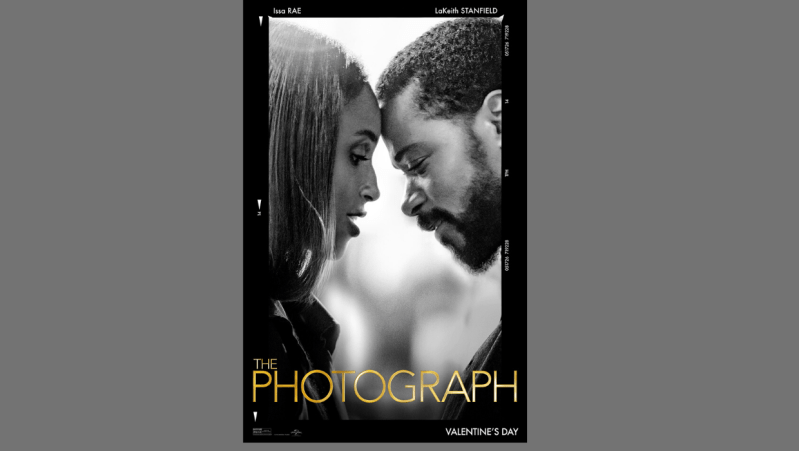Issa Rae’s yellow sundress is reason enough to see Stella Meghie’s latest movie, “The Photograph” (2020). The charming drama released on Valentine’s Day embraces its audience with the sweet and simple tenor of Russel Stover’s favorite holiday. Although it does not access the psychological depths expected for a movie centered on a supposedly tenuous mother-daughter relationship, “The Photograph” delivers the wholesome love story we needed to root for. Meghie has struck a delicate balance between a playful detailing and a profound dissection of filial and romantic love.
The film begins with a recording of Christina Eames (Chante Adams) lamenting, “I wish I had put as much courage into love as I put into my work.” From this efficient entryway into the crucial themes of the movie, the audience is transported into present-day Louisiana, where reporter Michael Block (animated by a suave Lakeith Stanfield) is writing a story about the Gulf Coast oil spill. Michael interviews oil worker Isaac Jefferson (Rob Morgan), who keeps an old photograph of Christina on his mantle and is curt in his responses concerning the nature of their relationship. Michael’s investigation continues to New York, where he speaks with Christina’s daughter, Queens Museum curator Mae Morton (Issa Rae). From this first interaction, Michael is interested in Mae, and the rest of the film toggles between scenes of their growing relationship and Christina’s strained young adult life.
Meghie’s aestheticism is nearly flawless — Isaac’s home embodies bucolic Louisiana, portrayed in a muted and yellowed color palette that contrasts the harsh hues of New York City. Mae sports a sleek ponytail and a restful posture in Louisiana that serves as the antithesis of her New York City stiffness. Further, the scene that at last renders Michael and Mae a convincingly passionate pair occurs in the overgrown spring of Christina’s shed darkroom. In this intimate scene, which is cinematically paralleled with one between Christina and a young Isaac (Y’lan Noel), Michael and Mae are transfigured into the shadows of Christina’s ever-unraveling story.
From the flashbacks to Christina’s life to the motif of photography to the shot of Big Ben in the brief ending scenes, the relentlessness of time recurs as a unifying theme. In an interview with Fab TV, Chante Adams described her hope that audiences would leave the theater with an itch to call a relative or reconnect with a lover they’d written out of their lives. She emphasized the chances that time doles out to us time and time again, that “too late” is an excuse for dishonesty. Adams’ latter assertion is underscored in Christina’s concealment of Isaac as Mae’s father. However, Christina’s deception is reconciled in her letters, which courageously reveal the truths she couldn’t in her lifetime and orchestrate a heartwarming albeit unsatisfying reunion between Mae and Isaac. Moreover, Mae’s decision to pursue Michael even after what she considered her last chance proves to the audience that the end isn’t truly the end until you’re six feet deep. We experience this theme in a reconciliatory final sequence in which Mae and Michael successfully navigate a crowd to find each other after previous scenes in which they were intercepted literally by talkative coworkers or metaphorically by professional commitments.
Each protagonist clearly experiences fears that complicate their pursuits toward intimacy — Mae is perpetually afraid of becoming her distant mother, and the archetypal suburban life of Michael’s brother repels him. In Mae’s apartment, the two drink whiskey, while later a storm finds them escaping to Michael’s brother’s home to drink the more temperate wine with exhausted but amiable young parents. They joke and gladly engage in the kind of “grown-up talk” that the children upstairs are not allowed to hear. Thus, their growing closeness begins to quell their fears and deconstruct the pretenses they’ve sustained as means of self-protection. Meghie’s screenplay is impactful in its discovery of how raw truth and authenticity make love beautiful.
Despite its striking style and well-intended messages, elements of the narrative are lacking in proper development. The two love stories (between Christina and Isaac and between Mae and Michael) are enchanting, but their alternation leaves the audience poorly acquainted with either. Further, the movie purportedly focuses on the strained relationship between Mae and her mother, but the tension we see more glaringly is actually that between Christina and her mother as she navigates her mother’s disapproval of her passion for photography and her romance with Isaac. Christina is an affectionate and creative mother, holding young Mae for a picture in her childhood home, which is taken with a camera she sets above a pan to resemble her prioritization of artistic work in New York over domesticity in Louisiana. It is thus difficult to imagine her shortcomings that supposedly torture Mae as a daughter. Finally, the revelation of Isaac as Mae’s father arises in a seemingly inauthentic manner and exerts little transformative power over the course of the narrative.
Meghie’s story ultimately fills a vital void in film media that is the love stories of people of color, specifically black lovers whose connection is forged in depth rather than in comedy. Every kid coming of age needs a heartwarming romance drama for Valentine’s Day, for the holidays spent single, for the breakups — and they should be able to see this romance realized for characters that look like them. The finale leaves us with a smile that is so wide and unrelenting that it hurts a little bit, and we cannot ask much more of romance movies than this.
Contact Malia Mendez at mjm2000 ‘at’ stanford.edu.
